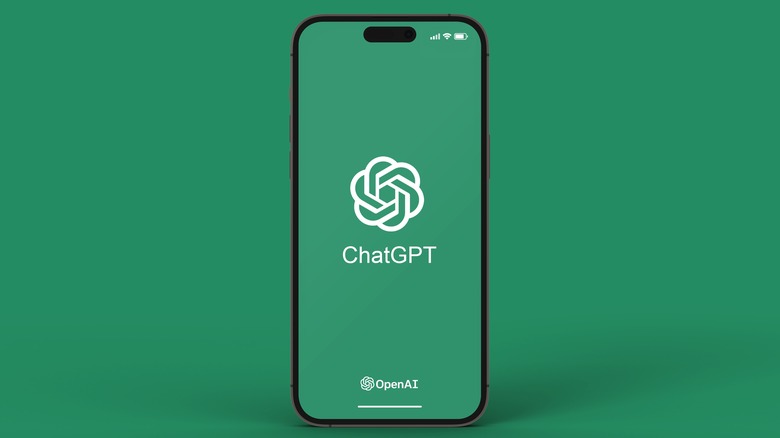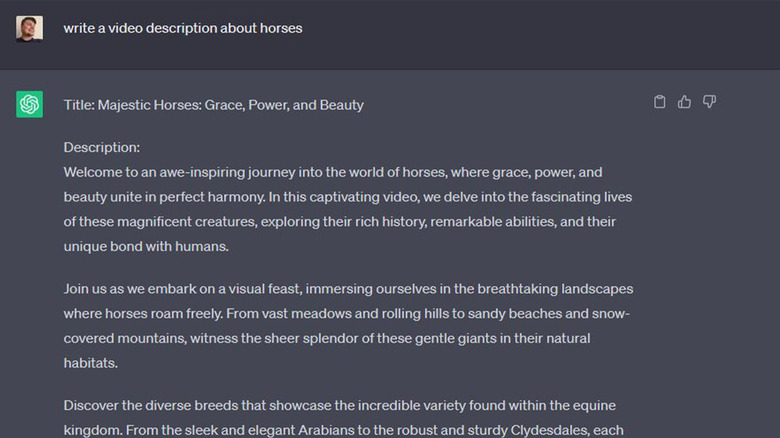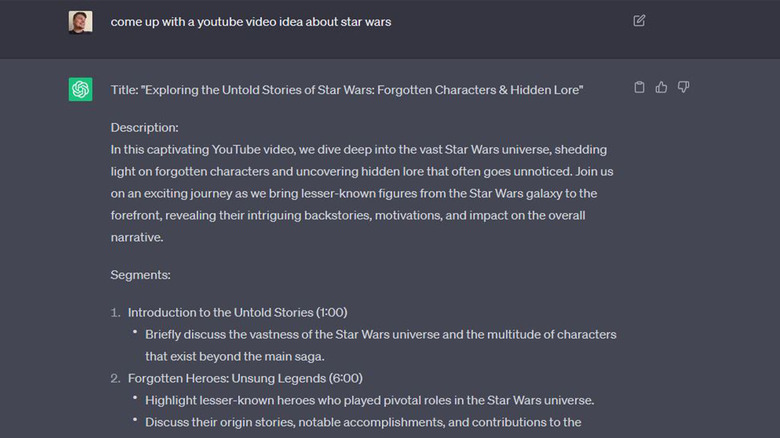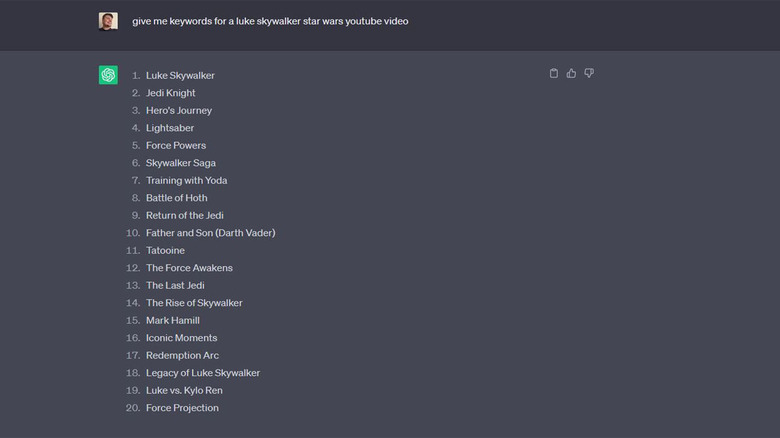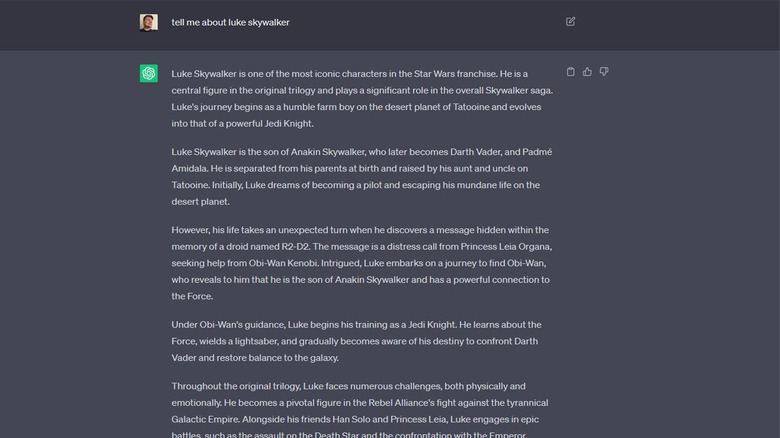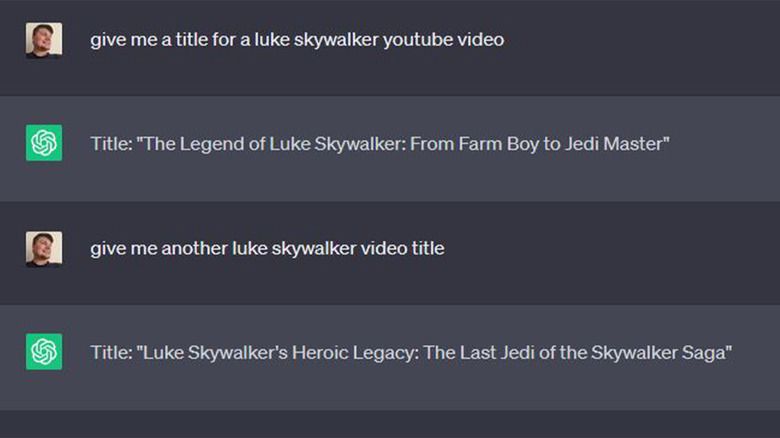5 Ways Content Creators Can Utilize Generative AI Like ChatGPT
AI and ChatGPT are growing and controversial, but there are some ethical ways to use the two. Some examples include creating a Spotify playlist or planning a vacation. Content creators are able to take advantage of AI as it can ease the burden of being a one-person show. Scripting, filming, running a YouTube channel, Instagram page, Twitter account, etc. can be exhausting for a single person. This is especially true if you're doing everything at once.
If you're having trouble captioning a picture, writing the perfect tweet, coming up with a description for a YouTube video, or even proofreading something, ChatGPT can help you out. You'll likely still have to do so finetuning to whatever it comes up with, but you'll be off to a good start with what the AI is able to create. You might even be surprised to see ChatGPT come up with a better caption or video title than you're able to.
Write a video description
Going through the process of filming a YouTube video, editing it, and then getting it ready to publish are usually the toughest parts of the whole process. However, coming up with a description that will accurately describe what the video is about in order to help with discoverability is very important. This is where ChatGPT can come in handy.
If you ask ChatGPT to come up with a video description, you'll probably get a very wordy response out of it, so you will have to trim quite a bit to get it down to something palatable to your average viewer. Nevertheless, its script may serve as a good starting point for a description, and you should be able to use a good chunk of it if you trim out the fat and keep what's important. You'll have to go more in-depth with what your video is to get a better response, but ChatGPT can cut a lot of time out of the process of writing a description entirely from scratch.
Come up with ideas
Whether you're a new content creator or a veteran of the internet, coming up with fresh ideas can be tough. If you're really stumped, you can ask ChatGPT to help come up with ideas for you, and there's a decent chance you'll find something worth doing just by plugging in a few prompts. Asking about a possible "Star Wars" video, ChatGPT was able to provide with not only a description, but a step-by-step process of what to talk about and where to do it, complete with timestamps. You don't have to take all of the ideas, but it's certainly an interesting way to brainstorm content ideas.
The response will depend on how specific your prompt is, so if you get something that doesn't sound appealing, just try again with more or different details. Asking the same question will also provide different responses, so you can give that a try as well if you're unhappy with the response.
Create SEO keywords
A major part of being a successful content creator is ensuring your videos, tweets, etc. can be seen by the general public. This is done by optimizing your content for search engines such as Google as well as using proper hashtags on Instagram and Twitter. Using the perfect hashtag won't guarantee millions of views, but it will put you in a much better position than using the wrong one or none at all.
ChatGPT can come up with specific keywords for your videos that help with discoverability. Going back to the "Star Wars" example, using something like Luke Skywalker as a keyword in a video about him might be something that comes naturally to you, but AI can help shed new light on keywords you might've overlooked. All you have to do is ask ChatGPT to give you a list of keywords for your video and wait for it to come up with a variety of ideas.
Provide background details
Continuing with the Star Wars example, if you're looking for some background details on any subject matter that might've slipped your mind to talk about for a video or podcast, ChatGPT can help fill in the gaps. Luke Skywalker is one of the most famous characters in the entire franchise, but it's fair to assume not everyone knows every little detail about him. Although he's a fictional character, ChatGPT has shown it can put together quite a detailed description of him, and it ought to work just the same for nonfiction content as well.
Using AI as a tool for things like this really cuts down a lot of the work of researching for yourself, and you can easily incorporate much of the information into your content. You'll still want to make sure you double-check the data given to you because there's no guarantee that the information you get back will entirely accurate. However, it will certainly save you some time scouring the internet for miscellaneous facts you may want to feature in your content.
Create the perfect title
Having the perfect video, description, and keywords are all nice, but it means nothing if you don't have a killer title to go with them. Finishing off once again using the "Star Wars" example, a fictional biography of Luke Skywalker wouldn't be done justice with a simple title like "Luke Skywalker Biography." Using AI, however, you can get something much catchier. Asking ChatGPT for a YouTube title about Luke Skywalker gave us "The Legend of Luke Skywalker: From Farm Boy to Jedi Master," something far more enticing. This title would cover just about all of his known life, and it would provide a much better hook to the video for casual and hardcore "Star Wars" fans alike.
If you don't like the titles it offers you, you can always ask again and see what else it comes up with. It helps to be more descriptive with what your content is about, so give extra details to ChatGPT if you have them.
